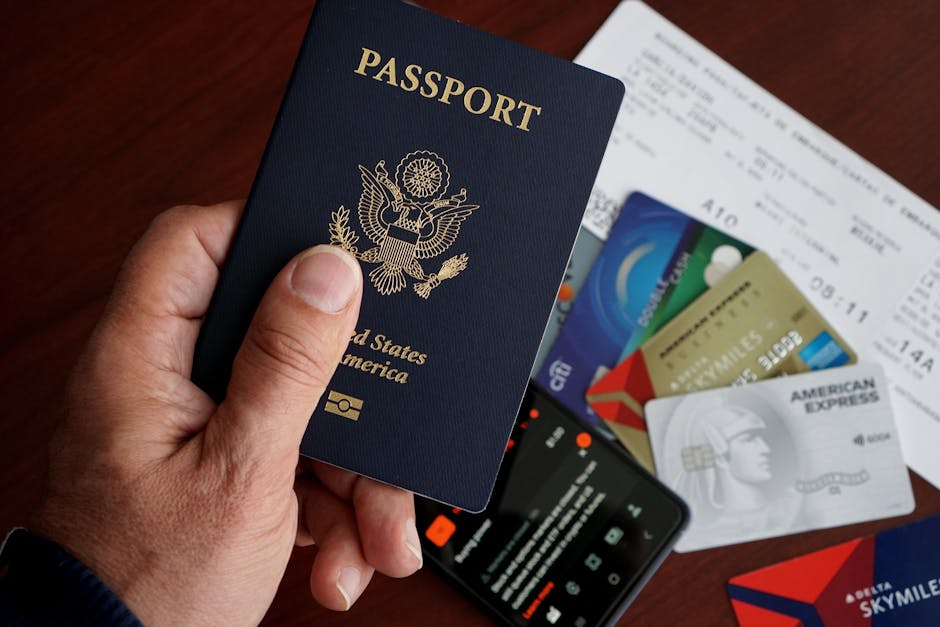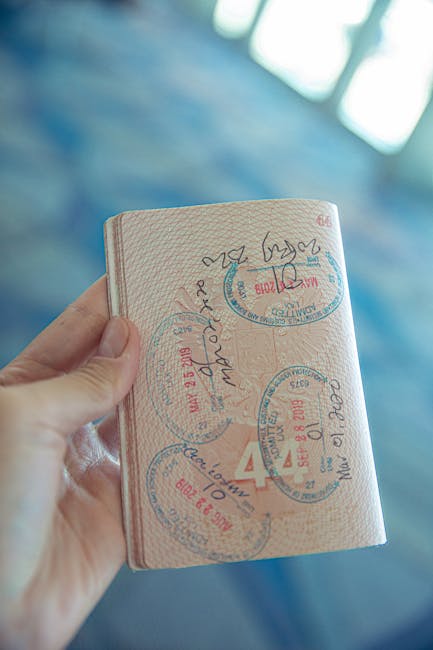Securing the correct visa documentation is the fundamental first step for any commis chef pursuing a culinary career overseas. This process, while often complex, unlocks a world of professional development and cultural immersion. Navigating international immigration systems requires meticulous attention to detail and a thorough understanding of specific country requirements. Consequently, preparation is paramount for a successful application.
Moreover, the journey involves more than just filling out forms. It encompasses gathering official paperwork, meeting health standards, and often proving your culinary qualifications to a foreign government. This guide provides a comprehensive roadmap for commis chefs aiming to work abroad. We will detail the essential documents, explain the common procedures, and offer expert advice to streamline your visa application process. Ultimately, proper preparation transforms a daunting task into a manageable series of steps.
## Understanding Work Visa Fundamentals
A work visa is an official permission stamped on your passport allowing you to take employment in another country. Each nation possesses its own unique set of immigration laws and categories for skilled workers like commis chefs. Generally, your prospective employer must first sponsor your application, proving they cannot fill the position locally. Therefore, securing a job offer is almost always the critical first step in this journey.
Furthermore, most countries issue work permits for a specific job with a specific employer. This means changing employers typically requires a new visa application. The duration of these visas varies significantly, ranging from one year to several years, often with options for renewal. Understanding these basic principles provides a solid foundation for navigating the more specific documentation requirements you will inevitably encounter.
## Essential Core Documents Checklist
Gathering the correct paperwork forms the backbone of any successful visa application for commis chefs. While requirements differ by destination country, a universal set of core documents is almost always mandatory. First, a valid passport with at least six months of remaining validity beyond your intended stay is non-negotiable. Additionally, you will need professionally taken passport-sized photographs that meet specific dimensional requirements.
Next, the formal job offer or contract from your overseas employer is crucial. This document should clearly state your position, salary, contract duration, and other key terms of employment. Furthermore, proof of your culinary qualifications, such as diplomas from culinary school or apprenticeship certificates, is essential to validate your skills. Finally, a detailed curriculum vitae (CV) outlining your work experience, skills, and education is typically required. Consistently double-check each document for accuracy before submission.
## Country-Specific Visa Requirements
Visa requirements for commis chefs vary dramatically depending on the destination country. For instance, the United Kingdom’s Skilled Worker Visa requires a job offer from a Home Office-licensed sponsor and meeting a specific minimum salary threshold. Similarly, Australia’s Temporary Skill Shortage (TSS) visa mandates that your occupation is on the relevant skilled occupation list and that you meet English language proficiency standards.
Conversely, countries in the Middle East, like the United Arab Emirates, often require extensive document attestation. This process involves getting your educational and personal certificates verified by multiple authorities. Meanwhile, Canada’s Temporary Foreign Worker Program requires the employer to obtain a Labour Market Impact Assessment (LMIA) to hire internationally. Researching your target country’s official immigration website is therefore an indispensable step in your preparation.
## The Critical Role of Employer Sponsorship
Employer sponsorship is the cornerstone of most work visa applications for commis chefs. Essentially, the hiring restaurant or hotel acts as your sponsor, initiating and supporting your visa process. They must typically prove to their national immigration authority that no suitable local candidate was available for the position. This often involves advertising the role for a minimum period locally.
Moreover, the sponsor usually provides crucial documents for your application. These include a formal sponsorship letter, a copy of the business license, and sometimes financial records. The employer also often guides you through the specific procedural steps required by their country. Consequently, maintaining clear and consistent communication with your future employer throughout this phase is absolutely vital for a smooth experience.
## Health and Character Certification
Most countries mandate strict health and character checks for incoming foreign workers. You will likely need to undergo a comprehensive medical examination from an approved physician. This exam typically includes chest X-rays for tuberculosis screening and blood tests for certain communicable diseases. The goal is to protect public health and ensure you do not place undue burden on the host nation’s healthcare system.
Similarly, providing police clearance certificates from every country you have lived in for a specified period (often 6-12 months) is standard practice. These documents prove you have no serious criminal record. Importantly, obtaining police certificates can be a time-consuming process, so you should initiate these requests early. Therefore, planning ahead for these certifications is crucial to avoid delays in your visa processing timeline.
## Financial Proof and Support Evidence
Immigration authorities frequently require evidence that you can support yourself financially upon arrival. This ensures you will not become a public burden. You may need to provide recent bank statements showing sufficient savings to cover initial living costs. The required amount varies significantly by country and sometimes even by city, reflecting the local cost of living.
Alternatively, your employer can provide a formal undertaking or guarantee of financial support. This document states they will cover your accommodation and living expenses if necessary. Some countries also require proof of purchased health insurance coverage valid for the duration of your stay. Assembling clear and verifiable financial documentation is a key step in demonstrating your preparedness and stability to immigration officials.
## The Application Submission Process
Submitting your visa application demands precision and careful attention to detail. Today, many countries utilize online application portals where you must upload scanned copies of all required documents. However, some destinations still require in-person submissions at an embassy, consulate, or authorized visa application center. Furthermore, paying the correct application fee is a critical step, as mistakes can lead to immediate rejection.
Additionally, you may be required to provide biometric information, such as fingerprints and a digital photograph, at a designated location. After submission, the processing time can range from a few weeks to several months, depending on the country and time of year. It is essential to apply well in advance of your intended start date to accommodate these variable processing times and any unforeseen delays.
## Navigating Common Challenges and Rejections
Visa applications can face hurdles, and understanding potential pitfalls is crucial. Common reasons for rejection include incomplete application forms, insufficient supporting documents, or failure to meet health/character requirements. Additionally, even minor discrepancies in information across different forms can raise red flags and lead to delays or denial.
If your application is rejected, most countries provide a reason for the decision and information on the appeals process. This might involve rectifying the issue and reapplying or formally appealing the decision. Seeking advice from an immigration expert or your employer’s HR department is highly recommended in such situations. Persistence and a methodical approach to addressing the stated reasons for refusal are often the keys to eventual success.
## Preparing for the Visa Interview
Some countries require a visa interview as the final step in the process. This interview allows a consular officer to verify the information in your application and assess your intentions. Preparation is essential. You should be ready to discuss your job offer, your culinary background, and your plans for residing in the host country. Practice answering questions clearly and confidently.
Furthermore, review your entire application thoroughly before the interview. The officer may ask specific questions about the details you provided. Dress professionally and arrive early for your appointment. Bring original copies of all your supporting documents, including your passport, educational certificates, and employment contract. Treating the interview with the seriousness of a job interview significantly increases your chances of a positive outcome.
## Post-Approval Steps and Relocation
Once your visa is approved, several important tasks remain before you depart. First, carefully review the visa vignette (sticker) in your passport to ensure all details are correct. Next, you must often register with local authorities soon after arriving in your new country. This might involve obtaining a residence permit or an national identity number.
Moreover, understanding the conditions of your visa is critical. These conditions can include restrictions on working for any employer other than your sponsor or requirements to maintain valid health insurance. Finally, ensure you have arranged initial accommodation and understand the logistics of your first few days, such as how to get from the airport to your new home. Proper planning for arrival ensures a smooth transition into your new role and life abroad.
## Frequently Asked Questions
### What is the most important document for a commis chef work visa?
The single most critical document is a valid job offer or employment contract from a licensed sponsor abroad. This offer is the foundation upon which the entire visa application is built.
### How long does the visa process typically take for commis chefs?
Processing times vary widely by country. It can take anywhere from 4 weeks to 4 months. Factors include the destination’s bureaucracy, time of year, and completeness of your application.
### Can my family join me on my work visa abroad?
Many countries allow dependents (spouses and children) to accompany primary visa holders on dependent visas. However, this requires additional documentation and proof of ability to support them financially.
### What are the common reasons for visa rejection?
Common rejections stem from incomplete applications, insufficient financial proof, a failed medical exam, or an unconvincing case that you will return home after your visa expires.
### Do I need to speak the local language to get a visa?
While not always a strict visa requirement, proficiency in the local language is highly beneficial for daily life and is often required by employers for effective kitchen communication.
### What is the role of a visa agent in this process?
A visa agent or immigration lawyer can provide expert guidance, ensure your application is complete, and help navigate complex rules. However, they are not mandatory if you are comfortable managing the process yourself.
### How can I verify if a job offer from abroad is legitimate?
Research the employer extensively, check for reviews from other employees, and be wary of offers that seem too good to be true. Legitimate employers will never ask for large fees upfront to process your visa.
### What happens if I lose my job while on a work visa?
Visa regulations typically grant a short grace period (e.g., 30-60 days) to find a new sponsor and transfer your visa or to make arrangements to leave the country.
## Conclusion
Securing the correct visa documentation for commis chefs abroad is a detailed but entirely achievable process. It demands organization, patience, and a meticulous approach to following instructions. By understanding the requirements, gathering your documents early, and working closely with your employer, you can navigate the path successfully. This effort is the key that unlocks a world of culinary opportunity and professional growth.
The journey to working in a foreign kitchen begins with these crucial administrative steps. Embrace the process as the first challenge of your international adventure. For personalized guidance and support, consider reaching out to professionals who specialize in culinary migration. **We strongly encourage you to seek professional visa documentation support to ensure your application is flawless and to maximize your chances of approval.** Your global culinary career awaits.




